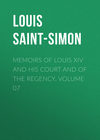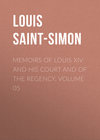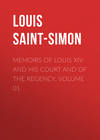Czytaj książkę: «Memoirs of Louis XIV and His Court and of the Regency. Complete», strona 79
CHAPTER CX
Here I think will be the fitting place to introduce an account of the daily life of the King and Queen of Spain, which in many respects was entitled to be regarded as singular. During my stay at the Court I had plenty of opportunity to mark it well, so that what I relate may be said to have passed under my own eyes. This, then, was their daily life wherever they were, and in all times and seasons.
The King and Queen never had more than one apartment, and one bed between them, the latter exactly as I have described it when relating my visit with Maulevrier to their Catholic Majesties to carry to them the news of the departure from Paris of the future Princess of the Asturias. During fevers, illness, no matter of what kind, or on whose side, childbirth even,—never were they a single night apart, and even when the deceased Queen was eaten up with the scrofula, the King continued to sleep with her until a few nights before her death!
About nine o’clock in the morning the curtains were drawn by the Asafeta, followed by a single valet carrying a basin full of caudle. Hyghens, during my convalescence, explained to me how this caudle was made, and in fact concocted some for me to taste. It is a light mixture of broth, milk, wine (which is in the largest quantity), one or two yolks of eggs, sugar, cinnamon, and a few cloves. It is white; has a very strong taste, not unmixed with softness. I should not like to take it habitually, nevertheless it is not disagreeable. You put in it, if you like, crusts of bread, or, at times, toast, and then it becomes a species of soup; otherwise it is drunk as broth; and, ordinarily, it was in this last fashion the King took it. It is unctuous, but very warm, a restorative singularly good for retrieving the past night, and, for preparing you for the next.
While the King partook of this brief breakfast, the Asafeta brought the Queen some tapestry to work at, passed bed-gowns to their Majesties, and put upon the bed some of the papers she found upon the adjoining seats, then withdrew with the valet and what he had brought. Their Majesties then said their morning prayers. Grimaldo afterwards entered. Sometimes they signalled to him to wait, as he came in, and called him when their prayer was over, for there was nobody else, and the bedroom was very small. Then Grimaldo displayed his papers, drew from his pocket an inkstand, and worked with the King; the Queen not being hindered by her tapestry from giving her opinion.
This work lasted more or less according to the business, or to the conversation. Grimaldo, upon leaving with his papers, found the adjoining room empty, and a valet in that beyond, who, seeing him pass, entered into the empty room, crossed it, and summoned the Asafeta, who immediately came and presented to the King his slippers and his dressing- gown; he at once passed across the empty room and entered into a cabinet, where he dressed himself, followed by three valets (never changed) and by the Duc del Arco, or the Marquis de Santa Cruz, and after by both, nobody else ever being present at the ceremony.
The Queen, as soon as the King had passed into his cabinet, put on her stockings and shoes alone with the Asafeta, who gave her her dressing- gown. It was the only moment in which this person could speak to the Queen, or the Queen to her; but this moment did not stretch at the most to more than half a quarter of an hour. Had they been longer together the King would have known it, and would have wanted to hear what kept them. The Queen passed through the empty chamber and entered into a fine large cabinet, where her toilette awaited her. When the King had dressed in his cabinet—where he often spoke to his confessor—he went to the Queen’s toilette, followed by the two seigneurs just named. A few of the specially—privileged were also admitted there. This toilette lasted about three-quarters of an hour, the King and all the rest of the company standing.
When it was over, the King half opened the door of the Hall of Mirrors, which leads into the salon where the Court assembled, and gave his orders; then rejoined the Queen in that room which I have so often called the empty room. There and then took place the private audiences of the foreign ministers, and of, the seigneurs, or other subjects who obtained them. Once a week, on Monday, there was a public audience, a practice which cannot be too much praised where it is not abused. The King, instead of half opening the door, threw it wide open, and admitted whoever liked to enter. People spoke to the King as much as they liked, how they liked, and gave him in writing what they liked. But the Spaniards resemble in nothing the French; they are measured, discreet, respectful, brief.
After the audiences, or after amusing himself with the Queen—if there are none, the King went to dress. The Queen accompanied him, and they took the communion together (never separately) about once a week, and then they heard a second mass. The confession of the King was said after he rose, and before he went to the Queen’s toilette.
Upon returning from mass, or very shortly after, the dinner was served. It was always in the Queen’s apartment, as well as the supper, but the King and Queen had each their dishes; the former, few, the latter, many, for she liked eating, and ate of everything; the King always kept to the same things—soup, capon, pigeons, boiled and roast, and always a roast loin of veal—no fruit; or salad, or cheese; pastry, rarely, never maigre; eggs, often cooked in various fashion; and he drank nothing but champagne; the Queen the same. When the dinner was finished, they prayed to God together. If anything pressing happened, Grimaldo came and gave them a brief account of it.
About an hour after dinner, they left the apartment by a short passage accessible to the court, and descended by a little staircase to their coach, returning by the same way. The seigneurs who frequented the court pretty constantly assembled, now one, now another, in this passage, or followed their Majesties to their coaches. Very often I saw them in this passage as they went or returned. The Queen always said something pleasant to whoever was there. I will speak elsewhere of the hunting- party their Majesties daily made.
Upon returning, the King gave his orders. If they had not partaken of a collation in the coach, they partook of one upon arriving. It was for the King, a morsel of bread, a big biscuit, some water and wine; and for the Queen, pastry and fruit in season, sometimes cheese. The Prince and the Princess of the Asturias, and the children, followed and waited for them in the inner apartment. This company withdrew in less than half a quarter of an hour. Grimaldo came and worked ordinarily for a long time; it was the time for the real work of the day. When the Queen went to confession this also was the time she selected. Except what related to the confession, she and her confessor had no time to say anything to each other. The cabinet in which she confessed to him was contiguous to the room occupied by the King, and when the latter thought the confession too long, he opened the door and called her. Grimaldo being gone, they prayed together, or sometimes occupied themselves with spiritual reading until supper. It was served like the dinner. At both meals there were more dishes in the French style than in the Spanish, or even the Italian.
After supper, conversation or prayers conducted them to the hour for bed, when nearly the same observances took place as in the morning. Finally, their Catholic Majesties everywhere had but one wardrobe between them, and were never in private one from another.
These uniform days were the same in all places, and even during the journeys taken by their Majesties, who were thus never separated, except for a few minutes at a time. They passed their lives in one long tete-a- tete. When they travelled it was at the merest snail’s pace, and they slept on the road, night after night, in houses prepared for them. In their coach they were always alone; when in the palace it was the same.
The King had been accustomed to this monotonous life by his first queen, and he did not care for any other. The new Queen, upon arriving, soon found this out, and found also that if she wished to rule him, she must keep him in the same room, confined as he had been kept by her predecessor. Alberoni was the only person admitted to their privacy. This second marriage of the King of Spain, entirely brought about by Madame des Ursins, was very distasteful to the Spaniards, who detested that personage most warmly, and were in consequence predisposed to look unfavourably upon anyone she favoured. It is true, the new Queen, on arriving, drove out Madame des Ursins, but this showed her to be possessed of as much power as the woman she displaced, and when she began to exercise that power in other directions the popular dislike to her was increased. She made no effort to mitigate it—hating the Spaniards as much as they hated her—and it is incredible to what an extent this reciprocal aversion stretched.
When the Queen went out with the King to the chase or to the atocha, the people unceasingly cried, as well as the citizens in their shops, “Viva el Re y la Savoyana, y la Savoyana,” and incessantly repeated, with all their lungs, “la Savoyana,” which is the deceased Queen (I say this to prevent mistake), no voice ever crying “Viva la Reina.” The Queen pretended to despise this, but inwardly raged (as people saw), she could not habituate herself to it. She has said to me very frequently and more than once: “The Spaniards do not like me, and in return I hate them,” with an air of anger and of pique.
These long details upon the daily life of the King and Queen may appear trivial, but they will not be judged so by those who know, as I do, what valuable information is to be gained from similar particulars. I will simply say in passing, that an experience of twenty years has convinced me that the knowledge of such details is the key to many others, and that it is always wanting in histories, often in memoirs the most interesting and instructive, but which would be much more so if they had not neglected this chapter, regarded by those who do not know its price, as a bagatelle unworthy of entering into a serious recital. Nevertheless, I am quite certain, that there is not a minister of state, a favourite, or a single person of whatever rank, initiated by his office into the domestic life of sovereigns, who will not echo my sentiments.
And now let me give a more distinct account of the King of Spain than I have yet written.
Philip V. was not gifted with superior understanding or with any stock of what is called imagination. He was cold, silent, sad, sober, fond of no pleasure except the chase, fearing society, fearing himself, unexpansive, a recluse by taste and habits, rarely touched by others, of good sense nevertheless, and upright, with a tolerably good knowledge of things, obstinate when he liked, and often then not to be moved; nevertheless, easy at other times to govern and influence.
He was cold. In his campaigns he allowed himself to be led into any position, even under a brisk fire, without budging in the slightest; nay, amusing himself by seeing whether anybody was afraid. Secured and removed from danger he was the same, without thinking that his glory could suffer by it. He liked to make war, but was indifferent whether he went there or not; and present or absent, left everything to the generals without doing anything himself.
He was extremely vain; could bear no opposition in any of his enterprises; and what made me judge he liked praise, was that the Queen invariably praised him—even his face; and asked me one day, at the end of an audience which had led us into conversation, if I did not think him very handsome, and more so than any one I knew?—His piety was only custom, scruples, fears, little observances, without knowing anything of religion: the Pope a divinity when not opposed to him; in fact he had the outside religion of the Jesuits, of whom he was passionately fond.
Although his health was very good, he always feared for it; he was always looking after it. A physician, such as the one Louis XI. enriched so much at the end of his life; a Maitre Coythier would have become a rich and powerful personage by his side; fortunately his physician was a thoroughly good and honourable man, and he who succeeded him devoted to the Queen. Philip V. could speak well—very well, but was often hindered by idleness and self-mistrust. To the audiences I had with him, however, he astonished me by the precision, the grace, the easiness of his words. He was good, easy to serve, familiar with a few. His love of France showed itself in everything. He preserved much gratitude and veneration for the deceased King, and tenderness for the late Monsieur; above all for the Dauphin, his brother, for whose loss he was never consoled. I noticed nothing in him towards any other of the royal family, except the King; and he never asked me concerning anybody in the Court, except, and then in a friendly manner, the Duchesse de Beauvilliers.
He had scruples respecting his crown, that can with difficulty be reconciled with the desire he had to return, in case of misfortune, to the throne of his fathers, which he had more than once so solemnly renounced. He believed himself an usurper! and in this idea nourished his desire to return to France, and abandon Spain and his scruples at one and the same time. It cannot be disguised that all this was very ill- arranged in his head, but there it was, and he would have abandoned Spain had it been possible, because he felt compelled by duty to do so. It was this feeling which principally induced him, after meditating upon it long before I arrived in Spain, to abdicate his throne in favour of his son. It was the same usurpation in his eyes, but not being able to obey his scruples, he contented himself by doing all he could in abdicating. It was still this feeling which, at the death of his son, troubled him so much, when he saw himself compelled to reascend the throne; though, during his abdication, that son had caused him not a little vexation. As may well be imagined, Philip V. never spoke of these delicate matters to me, but I was not less well informed of them elsewhere.
The Queen desired not less to abandon Spain, which she hated, and to return into France and reign, where she hoped to lead a life of less seclusion, and much more agreeable.
Notwithstanding all I have said, it is perfectly true that Philip V. was but little troubled by the wars he made, that he was fond of enterprises, and that his passion was to be respected and dreaded, and to figure grandly in Europe.
But let me now more particularly describe the Queen.
This princess had much intellect and natural graces, which she knew how to put to account. Her sense, her reflection, and her conduct, were guided by that intellect, from which she drew all the charms and, all the advantages possible. Whoever knew her was astonished to find how her intelligence and natural capacity supplied the place of her want of knowledge of the world, of persons, of affairs, upon all of which subjects, her garret life in Parma, and afterwards her secluded life with the King of Spain, hindered her from obtaining any real instruction. The perspicuity she possessed, which enabled her to see the right side of everything that came under her inspection, was undeniable, and this singular gift would have become developed in her to perfection if its growth had not been interrupted by the ill-humour she possessed; which it must be admitted the life she led was more than enough to give her. She felt her talent and her strength, but did not feel the fatuity and pride which weakened them and rendered them ridiculous. The current of her life was simple, smooth, with a natural gaiety even, which sparkled through the eternal restraint of her existence; and despite the ill- temper and the sharpness which this restraint without rest gave her, she was a woman ordinarily without pretension, and really charming.
When she arrived in Spain she was sure, in the first place, of driving away Madame des Ursins, and of filling-her place in the government at once. She seized that place, and took possession also of the King’s mind, which she soon entirely ruled. As to public business, nothing could be hidden from her. The King always worked in her presence, never otherwise; all that he saw alone she read and discussed with him. She was always present at all the private audiences that he gave, whether to his subjects or to the foreign ministers; so that, as I have before remarked, nothing possibly could escape her.
As for the King, the eternal night and day tete-a-tete she had with him enabled her to sound him thoroughly, to know him by heart, so to speak. She knew perfectly the time for preparatory insinuations, their success; the resistance, when there was any, its course and how to overcome it; the moments for yielding, in order to return afterwards to the charge, and those for holding firm and carrying everything by force. She stood in need of all these intrigues, notwithstanding her credit with the King. If I may dare to say it, his temperament was her strong point, and she sometimes had recourse to it. Then her coldness excited tempests. The King cried and menaced; now and then went further; she held firm, wept, and sometimes defended herself. In the morning all was stormy. The immediate attendants acted towards King and Queen often without penetrating the cause of their quarrel. Peace was concluded at the first opportunity, rarely to the disadvantage of the Queen, who mostly had her own way.
A quarrel of this sort arose when I was at Madrid; and I was advised, after hearing details I will not repeat, to mix myself up in it, but I burst out laughing and took good care not to follow this counsel.
CHAPTER CXI
The chase was every day the amusement of the King, and the Queen was obliged to make it hers. But it was always the same. Their Catholic Majesties did me the singular honour to invite me to it once, and I went in my coach. Thus I saw this pleasure well, and to see it once is to see it always. Animals to shoot are not met with in the plains. They must be sought for among the mountains,—and there the ground is too rugged for hunting the stag, the wild boar, and other beasts as we hunt the hare,—and elsewhere. The plains even are so dry, so hard, so full of deep crevices (that are not perceived until their brink is reached), that the best hounds or harriers would soon be knocked up, and would have their feet blistered, nay lamed, for a long time. Besides, the ground is so thickly covered with sturdy vegetation that the hounds could not derive much help from their noses. Mere shooting on the wing the King had long since quitted, and he had ceased to mount his horse; thus the chase simply resolved itself into a battue.
The Duc del Orco, who, by his post of grand ecuyer, had the superintendence of all the hunting arrangements, chose the place where the King and Queen were to go. Two large arbours were erected there, the one against the other, entirely shut in, except where two large openings, like windows, were made, of breast-height. The King, the Queen, the captain of the guards, and the grand ecuyer were in the first arbour with about twenty guns and the wherewithal to load them. In the other arbour, the day I was present, were the Prince of the Asturias, who came in his coach with the Duc de Ponoli and the Marquis del Surco, the Marquis de Santa Cruz, the Duc Giovenazzo, majordomo, major and grand ecuyer to the Queen, Valouse, two or three officers of the body-guard, and I myself. We had a number of guns, and some men to load them. A single lady of the palace followed the Queen all alone, in another coach, which she did not quit; she carried with her, for her consolation, a book or some work, for no one approached her. Their Majesties and their suite went to the chase in hot haste with relays of guards and of coach horses, for the distance was at least three or four leagues; at the least double that from Paris to Versailles. The party alighted at the arbours, and immediately the carriages, the poor lady of the palace, and all the horses were led away far out of sight, lest they should frighten the beasts.
Two, three, four hundred peasants had early in the morning beaten the country round, with hue and cry, after having enclosed it and driven all the animals together as near these arbours as possible. When in the arbour you were not allowed to stir, or to make the slightest remarks, or to wear attractive colours; and everybody stood up in silence.
This period of expectation lasted an hour and a half, and did not appear to me very amusing. At last we heard loud cries from afar, and soon after we saw troops of animals pass and repass within shot and within half-shot of us; and then the King and the Queen banged away in good earnest. This diversion, or rather species of butchery, lasted more than half an hour, during which stags, hinds, roebucks, boars, hares, wolves, badgers, foxes, and numberless pole-cats passed; and were killed or lamed.
We were obliged to let the King and Queen fire first, although pretty often they permitted the grand ecuyer and the captain of the guard to fire also; and as we did not know from whom came the report, we were obliged to wait until the King’s arbour was perfectly silent; then let the Prince shoot, who very often had nothing to shoot at, and we still less. Nevertheless, I killed a fox, but a little before I ought to have done so, at which, somewhat ashamed, I made my excuses to the Prince of the Asturias, who burst out laughing, and the company also, I following their example and all passing very politely.
In proportion as the peasants approach and draw nearer each other, the sport advances, and it finishes when they all come close to the arbours, still shouting, and with nothing more behind them. Then the coaches return, the company quits the arbours, the beasts killed are laid before the King. They are placed afterwards behind the coaches. During all this, conversation respecting the sport rolls on. We carried away this day about a dozen or more beasts, some hares, foxes, and polecats. The night overtook us soon after we quitted the arbours.
And this is the daily diversion of their Catholic Majesties.
It is time now, however, to resume the thread of my narrative, from which these curious and little-known details have led me.
I have shown in its place the motive which made me desire my embassy; it was to obtain the ‘grandesse’ for my second son, and thus to “branch” my house. I also desired to obtain the Toison d’Or for my eldest son, that he might derive from this journey an ornament which, at his age, was a decoration. I had left Paris with full liberty to employ every aid, in order to obtain these things; I had, too, from M. le Duc d’Orleans, the promise that he would expressly ask the King of Spain for the former favour, employing the name of the King, and letters of the strongest kind from Cardinal Dubois to Grimaldo and Father Aubenton. In the midst of the turmoil of affairs I spoke to both of these persons, and was favourably attended to.
Grimaldo was upright and truthful. He conceived a real friendship for me, and gave me, during my stay at Madrid, all sorts of proofs of it. He said that this union of the two Courts by the two marriages might influence the ministers. His sole point of support, in order to maintain himself in the post he occupied, so brilliant and so envied, was the King of Spain. The Queen, he found, could never be a solid foundation on which to repose. He wished, then, to support himself upon France, or at least to have no opposition from it, and he perfectly well knew the duplicity and caprices of Cardinal Dubois. The Court of Spain, at all times so watchful over M. le Duc d’Orleans, in consequence of what had passed in the time of the Princesse des Ursins, and during the Regency, was not ignorant of the intimate and uninterrupted confidence of this prince in me, or of the terms on which I was with him. These sort of things appear larger than they are, when seen from afar, and the choice that had been made of me for this singular embassy confirmed it still more! Grimaldo, then, might have thought to assure my friendship in his behalf, and my influence with M. le Duc d’Orleans, occasion demanding it; and I don’t think I am deceiving myself in attributing to him this policy while he aided me to obtain a favour, at bottom quite natural, and which could cause him no inconvenience.
I regarded the moment at which the marriage would be celebrated as that at which I stood most chance of obtaining what I desired, and I considered that if it passed over without result to me, all would grow cold, and become uncertain, and very disagreeable. I had forgotten nothing during this first stay in Madrid, in order to please everybody, and I make bold to say that I had all the better succeeded because I had tried to give weight and merit to my politeness, measuring it according to the persons I addressed, without prostitution and without avarice, and that’s what made me hasten to learn all I could of the birth, of the dignities, of the posts, of the alliances, of the reputation of each, so as to play my cards well, and secure the game.
But still I needed the letters of M. le Duc d’Orleans, and of Cardinal Dubois. I did not doubt the willingness of the Regent, but I did doubt, and very much too, that of his minister. It has been seen what reason I had for this.
These letters ought to have arrived at Madrid at the same time that I did, but they had not come, and there seemed no prospect of their arriving. What redoubled my impatience was that I read them beforehand, and that I wished to have the time to reflect, and to turn round, in order to draw from them, in spite of them, all the help I could. I reckoned that these letters would be in a feeble spirit, and this opinion made me more desirous to fortify my batteries in Spain in order to render myself agreeable to the King and Queen, and to inspire them with the desire to grant me the favours I wished.
A few days before going to Lerma I received letters from Cardinal Dubois upon my affair. Nobody could be more eager or more earnest than the Cardinal, for he gave me advice how to arrive at my aim, and pressed me to look out for everything which could aid me; assuring me that his letters, and those of M. le Duc d’Orleans, would arrive in time. In the midst of the perfume of so many flowers, the odour of falsehood could nevertheless be smelt. I had reckoned upon this. I had done all in my power to supply the place of these letters. I received therefore not as gospel, all the marvels Dubois sent me, and I set out for Lerma fully resolved to more and more cultivate my affair without reckoning upon the letters promised me; but determined to draw as much advantage from them as I could.
Upon arriving at Lerma I fell ill as I have described, and the small-pox kept me confined forty days: The letters so long promised and so long expected did not arrive until the end of my quarantine. They were just what I expected. Cardinal Dubois explained himself to Grimaldo in turns and circumlocution, and if one phrase displayed eagerness and desire, the next destroyed it by an air of respect and of discretion, protesting he wished simply what the King of Spain would himself wish, with all the seasoning necessary for the annihilation of his good offices under the pretence that he did not wish to press his Majesty to anything or to importune him.
This written stammering savoured of the bombast of a man who had no desire to serve me, but who, not daring to break his word, used all his wits to twist and overrate the little he could not hinder himself from saying. This letter was simply for Grimaldo, as the letter of M. le Duc d’Orleans was simply for the King of Spain. The last was even weaker than the first. It was like a design in pencil nearly effaced by the rain, and in which nothing, connected appeared. It scarcely touched upon the real point, but lost itself in respects, in reservations, in deference, and would propose nothing that was not according to the taste of the King! In a word, the letter withdrew rather than advanced, and was a sort of ease-conscience which could not be refused, and which did not promise much success.
It is easy to understand that these letters much displeased me. Although I had anticipated all the malice of Cardinal Dubois, I found it exceeded my calculations, and that it was more undisguised than I imagined it would be.
Such as the letters were I was obliged to make use of them. The Abbe de Saint-Simon wrote to Grimaldo and to Sartine, enclosing these letter, for I myself did not yet dare to write on account of the precautions I was obliged to use against the bad air. Sartine and Grimaldo, to whom I had not confided my suspicions that these recommendations would be in a very weak tone, were thrown into the utmost surprise on reading them.
They argued together, they were indignant, they searched for a bias to strengthen that which had so much need of strength, but this bias could not be found; they consulted together, and Grimaldo formed a bold resolution, which astonished me to the last degree, and much troubled me also.
He came to the conclusion that these letters would assuredly do me more harm than good; that they must be suppressed, never spoken of to the King, who must be confirmed without them in the belief that in according me these favours he would confer upon M. le Duc d’Orleans a pleasure, all the greater, because he saw to what point extended all his reserve in not speaking to him about this matter, and mine in not asking for these favours through his Royal Highness, as there was every reason to believe I should do. Grimaldo proposed to draw from these circumstances all the benefit he proposed to have drawn from the letters had they been written in a fitting spirit, and he said he would answer for it; I should have the ‘grandesse’ and the ‘Toison d’Or’ without making the slightest allusion to the cold recommendations of M. le Duc d’Orleans to the King of Spain, and of Dubois to him.



















